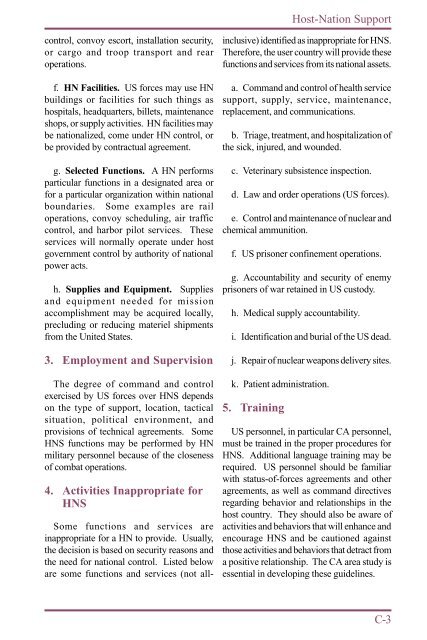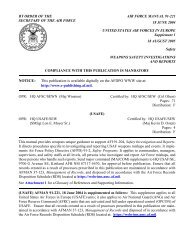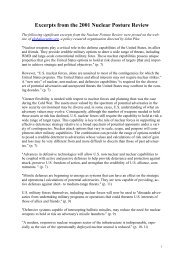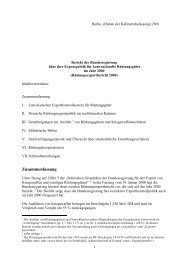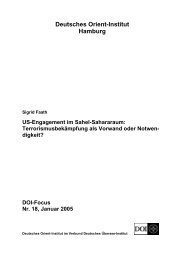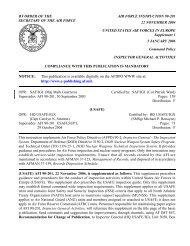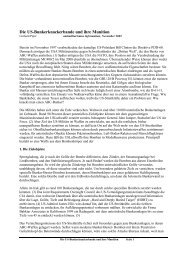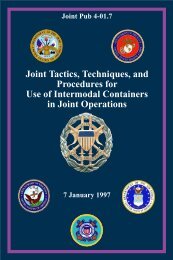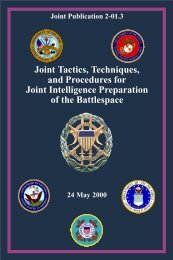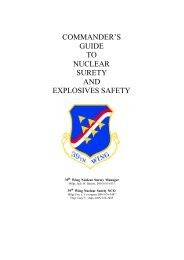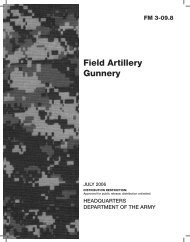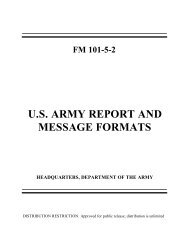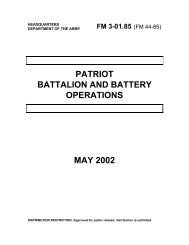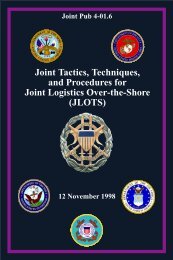JP 4-01.5 JTTP for Water Terminal Operations - BITS
JP 4-01.5 JTTP for Water Terminal Operations - BITS
JP 4-01.5 JTTP for Water Terminal Operations - BITS
Create successful ePaper yourself
Turn your PDF publications into a flip-book with our unique Google optimized e-Paper software.
control, convoy escort, installation security,<br />
or cargo and troop transport and rear<br />
operations.<br />
f. HN Facilities. US <strong>for</strong>ces may use HN<br />
buildings or facilities <strong>for</strong> such things as<br />
hospitals, headquarters, billets, maintenance<br />
shops, or supply activities. HN facilities may<br />
be nationalized, come under HN control, or<br />
be provided by contractual agreement.<br />
g. Selected Functions. A HN per<strong>for</strong>ms<br />
particular functions in a designated area or<br />
<strong>for</strong> a particular organization within national<br />
boundaries. Some examples are rail<br />
operations, convoy scheduling, air traffic<br />
control, and harbor pilot services. These<br />
services will normally operate under host<br />
government control by authority of national<br />
power acts.<br />
h. Supplies and Equipment. Supplies<br />
and equipment needed <strong>for</strong> mission<br />
accomplishment may be acquired locally,<br />
precluding or reducing materiel shipments<br />
from the United States.<br />
3. Employment and Supervision<br />
The degree of command and control<br />
exercised by US <strong>for</strong>ces over HNS depends<br />
on the type of support, location, tactical<br />
situation, political environment, and<br />
provisions of technical agreements. Some<br />
HNS functions may be per<strong>for</strong>med by HN<br />
military personnel because of the closeness<br />
of combat operations.<br />
4. Activities Inappropriate <strong>for</strong><br />
HNS<br />
Some functions and services are<br />
inappropriate <strong>for</strong> a HN to provide. Usually,<br />
the decision is based on security reasons and<br />
the need <strong>for</strong> national control. Listed below<br />
are some functions and services (not all-<br />
Host-Nation Support<br />
inclusive) identified as inappropriate <strong>for</strong> HNS.<br />
There<strong>for</strong>e, the user country will provide these<br />
functions and services from its national assets.<br />
a. Command and control of health service<br />
support, supply, service, maintenance,<br />
replacement, and communications.<br />
b. Triage, treatment, and hospitalization of<br />
the sick, injured, and wounded.<br />
c. Veterinary subsistence inspection.<br />
d. Law and order operations (US <strong>for</strong>ces).<br />
e. Control and maintenance of nuclear and<br />
chemical ammunition.<br />
f. US prisoner confinement operations.<br />
g. Accountability and security of enemy<br />
prisoners of war retained in US custody.<br />
h. Medical supply accountability.<br />
i. Identification and burial of the US dead.<br />
j. Repair of nuclear weapons delivery sites.<br />
k. Patient administration.<br />
5. Training<br />
US personnel, in particular CA personnel,<br />
must be trained in the proper procedures <strong>for</strong><br />
HNS. Additional language training may be<br />
required. US personnel should be familiar<br />
with status-of-<strong>for</strong>ces agreements and other<br />
agreements, as well as command directives<br />
regarding behavior and relationships in the<br />
host country. They should also be aware of<br />
activities and behaviors that will enhance and<br />
encourage HNS and be cautioned against<br />
those activities and behaviors that detract from<br />
a positive relationship. The CA area study is<br />
essential in developing these guidelines.<br />
C-3


